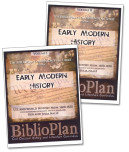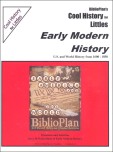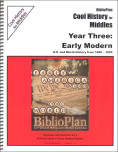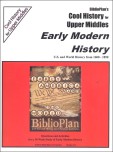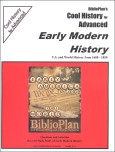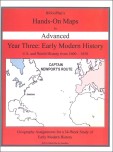We use cookies to make your experience better. To comply with the new e-Privacy directive, we need to ask for your consent to set the cookies. Learn more.
Year Three, Early Modern, is timely, in picking up in the early 1600's with King James and the first lasting American colony being established. Early Modern is the first year that includes United States History. This volume also follows the previous BiblioPlan format. There is one hardcover Remember the Days textbook, for grades K-7, and two soft-cover Companion textbooks for grades 8-12. This is a 6-Unit (34 weeks) course of study covering the New World, Western Europe, Asia and Eastern Europe, the American Revolution, Napoleon, and the Rebellion and Repression. Specific early American geography is also incorporated.
Now with the inclusion of U.S. studies, Volume 3 spends most of the lessons studying World and U.S. history side-by-side. The study of Native American indigenous groups is also included side-by-side with North American history. World studies include the Boers of South Africa, the French and Indian War, stories from China, Japan, Russia, and more. Volume 3 concludes with the Mexican American War and the California Gold Rush. Church history is woven into these studies as the strain between the monarch and the people rise. The pursuit of religious freedom focuses on groups like the Puritans and Quakers, as well as the colonies, and centralizes on the great awakening happening within Christianity all around the world.
The Family Guide will take you step-by-step through text readings from either one of the textbooks. Further literature, audio recordings, videos, maps, and activities are all found in individual spiral-bound books. Material found within each spiral-bound book may be reproduced for family needs. Select exactly what you want to cover with the program for each student (K-12) while studying Early Modern History together.
